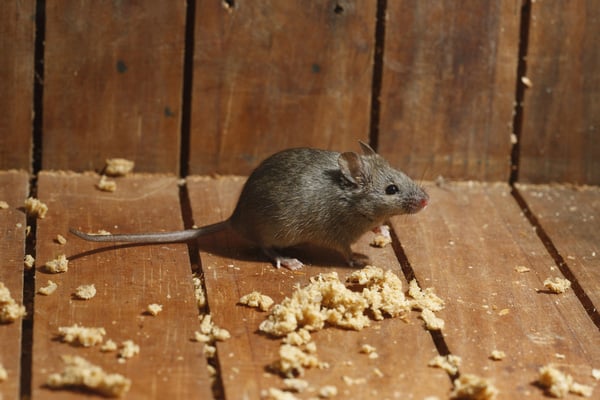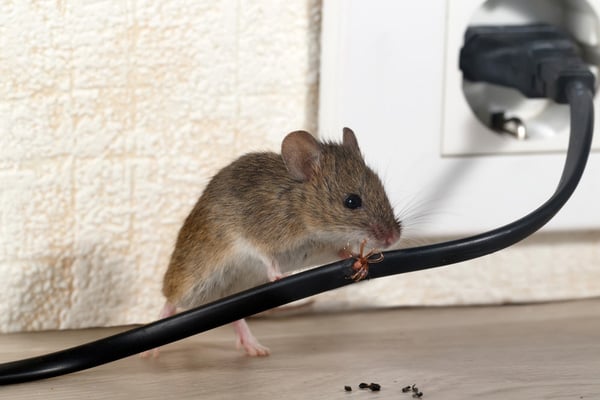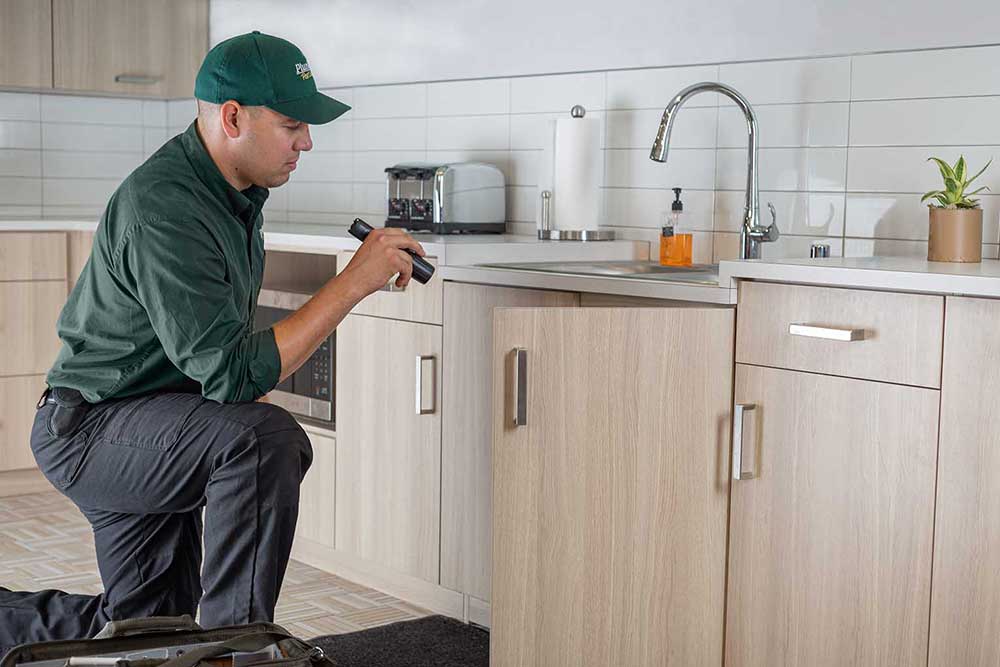How to Get Rid of House Mice
Do you have a house mouse infestation in your home? Plunkett’s can help! Schedule a service today.
About House Mice
The house mouse (Mus musculus) is the most frequently encountered rodent in homes. Unfortunately, house mice are more than a nuisance: they damage property, contaminate food, carry diseases, and even start fires!
Life Cycle
House mice reach maturity in just 35 days and are highly prolific breeders. While their life expectancy averages around one year, a female house mouse can give birth to 36 to 72 offspring in that time.
House Mice Behavior
House mice are social creatures who are most active at night. Related males and females are compatible, but unrelated male mice will typically behave aggressively toward one another. House mice tend to create and then protect home “territories,” which they mark with urine. Mature mice behave aggressively when another mouse enters their territory.
House mice prefer to build their nests inside their territory in dark, cramped, secluded areas where they can remain hidden—inside walls, attics, and crawl spaces. They build these nests out of any soft, chewable material they can find near prospective nesting sites. Most mice stick to a set foraging range inside their territory, though they may range further, if necessary. Mice like to move between different cover and shelter when foraging to remain hidden.


Appearance
Adult house mice are about 2½ to 3½” long, with a tail that’s around 2¾ to 4” long. They weigh around ½ to 1 ounce and have smooth, dust-gray, reddish-brown, or dark gray fur. House mice have a pointed muzzle, small eyes, un-grooved incisors, large ears, and short, white, broad feet. Their tails are uniformly dark, scaly, and semi-naked. In general, house mice appear smaller and skinnier than rats.
House Mice vs Field Mice Appearance
The two most common mouse species are house mice and field mice. A field mouse will appear bigger than a house mouse and have:
- A white or gray belly
- Wider face
- Larger eyes
- Larger ears
- Hair-covered tails
Field mice—often referred to as “deer mice”–tend to live in more rural areas and are less social than their urban cousins.
4 House Mice Control & Prevention Tips
To get rid of house mice, you must first understand their needs and habits. Mice enter homes in search of food, water, warmth, and shelter. If you can prevent mice from getting those things, they’re likely to leave you alone and search elsewhere.
1. Store Food Properly
Start with food. Keep all dry pantry goods in airtight, hard plastic containers. Thoroughly clean dining and food prep areas after every meal, and vacuum up crumbs and food remnants immediately. Cover your garbage and take it out regularly. Don’t leave residue behind in your bins. Look for other food sources like pet food or birdseed, and make sure they’re inaccessible to would-be rodent invaders.

2. Limit Moisture
Next, control the moisture and humidity in your home. Patch up drafts, fix plumbing leaks, and look for any stray water sources mice could exploit. Consider investing in a dehumidifier.
3. Seal Entry Points
To keep mice from finding warmth and shelter, you’ll have to close up their access points. Seal gaps around doors and windows, utility lines, and baseboarding. Make sure you’re thorough; mice can fit through a gap the size of a dime! Inside, keep nesting and hiding materials like boxes and bags elevated and as inaccessible as possible.
4. Call a Pest Professional
The best way to get rid of mice in your house is to contact Plunkett’s Pest Control as soon as you confirm their presence. Don’t wait–the sooner we arrive, the faster we can stop your rodents from multiplying out of control. Home remedies rarely solve the overarching problem. Let us remedy the problem permanently!
Professional House Mice Control
First, Plunkett’s technicians will identify the access points where house mice enter your home. We’ll make small repairs to seal up these openings ourselves and recommend how to repair the larger ones. Then, we’ll strategically set up rodenticide bait stations where they’ll be as effective as possible.
In some cases, we’ll set bait stations both inside and outside, around foundation walls or under decks. When necessary, we may also apply rodenticide tracking powder into infested structural voids directly. If our exclusion and baiting procedures don’t yield quick enough results, we may also use snap traps. Whatever the mouse problem, we’ll solve it quickly, unintrusively, and permanently.
Schedule a service with Plunkett’s today!

Frequently Asked Questions
Are house mice nocturnal?
Yes, house mice are nocturnal, meaning they are primarily active at night. During these hours, you may hear scratching, squeaking, or notice them scurrying across areas like the kitchen floor. Their nighttime activity helps them stay hidden from predators while they forage for food and seek shelter.
Why do house mice squeak?
Mice squeak for a couple of reasons. First, squeaking is a form of communication between mice, often signaling the presence of food, danger, or other important information. Second, squeaking can be an emotional response, such as expressing anxiety, distress, or even excitement. This communication helps them stay alert and connected with their colony.
Are house mice dangerous?
Despite their small size and seemingly harmless appearance, house mice can pose significant risks. They are known carriers of dangerous pathogens, such as bacteria and viruses, which can contaminate your food and living spaces. In addition to health risks, mice are persistent chewers, which means they can gnaw through wiring, wood, and insulation, potentially causing structural damage or even electrical fires.
How do you get rid of mice in your house?
Getting rid of house mice requires more than just setting out traps or poison. Professional pest control companies, like Plunkett’s, offer comprehensive solutions. We will assess the extent of your mouse problem, identify entry points, and implement a combination of exclusion techniques, baiting, and trapping to eliminate the infestation permanently. Professional services ensure that the mice are dealt with effectively and that preventative measures are put in place to keep them from returning.






